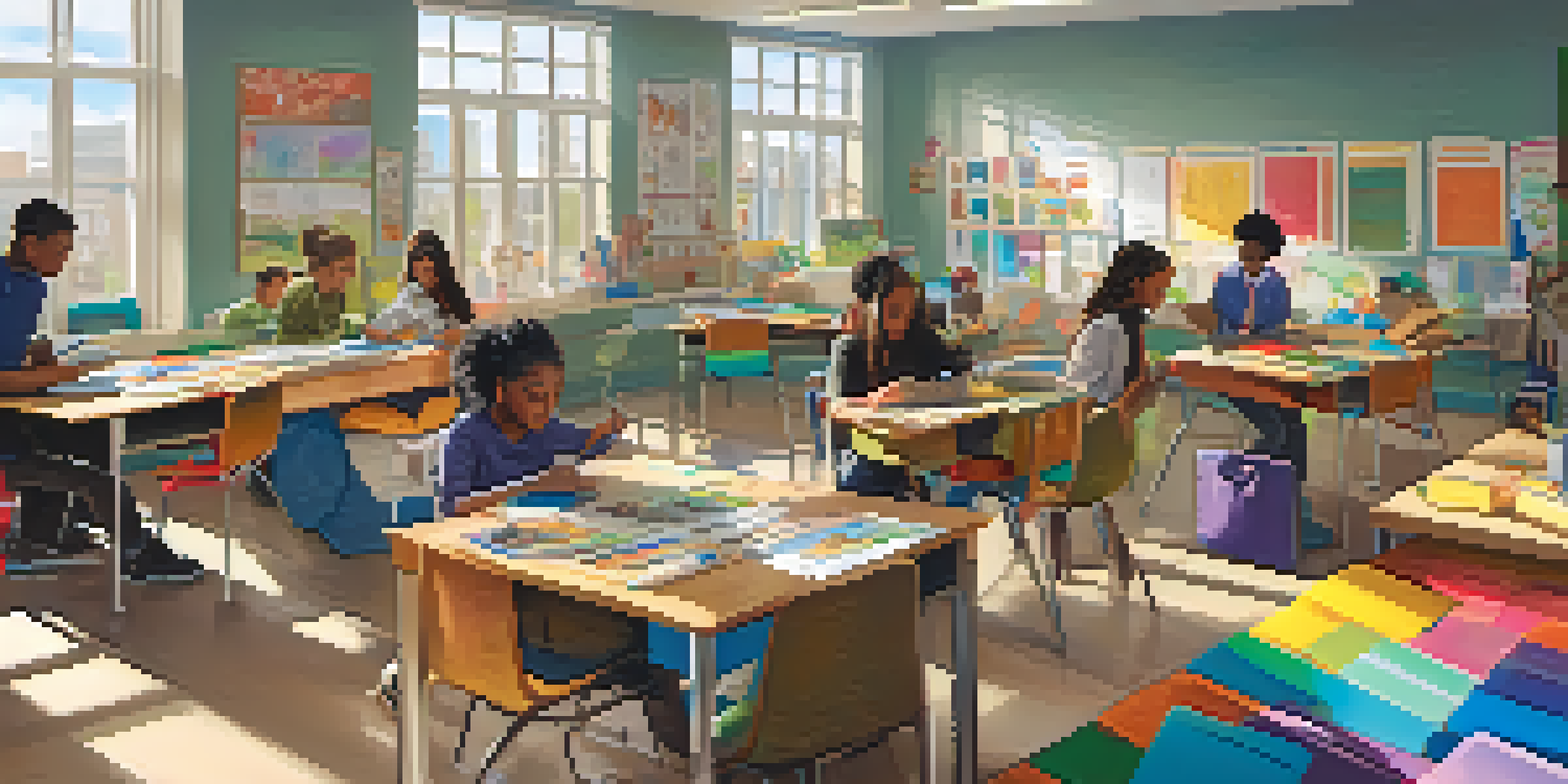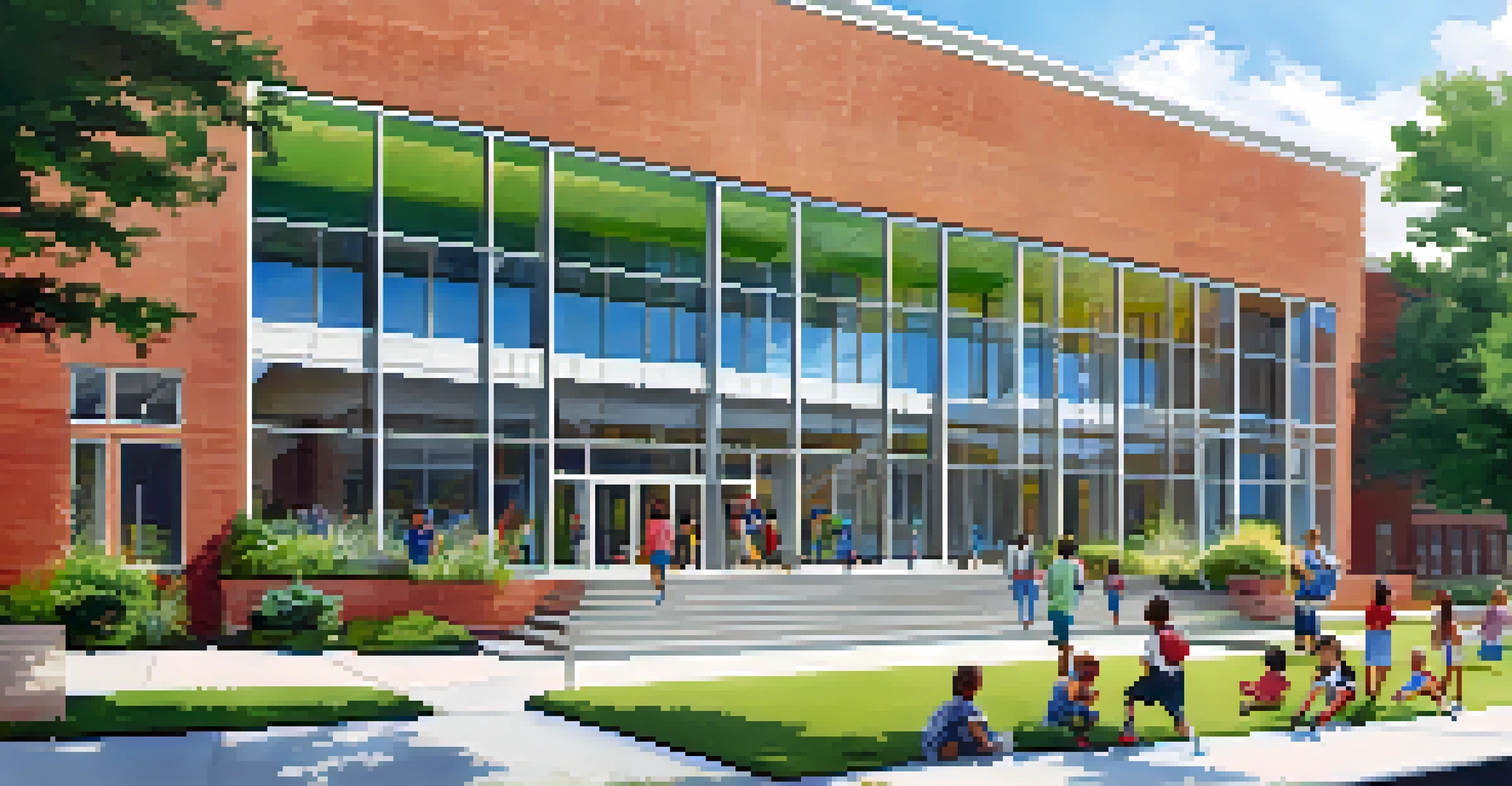The Role of Charter Schools in Charlotte's Education System

Understanding Charter Schools in Charlotte
Charter schools are publicly funded institutions that operate independently of the traditional school district system. In Charlotte, they provide parents and students with diverse educational options, often emphasizing innovative teaching methods and specialized curricula. This flexibility allows them to cater to the unique needs of various student populations, fostering an environment where students can thrive.
Charter schools offer a unique opportunity for parents and students to explore alternative educational pathways that might better suit their needs.
Unlike traditional public schools, charter schools have the ability to create their own educational programs and policies, which can lead to more personalized learning experiences. For instance, some charter schools might focus on STEM education, while others might prioritize the arts or bilingual education. This variety helps parents choose a school that aligns with their child's interests and learning style.
Despite their advantages, charter schools also face criticism and challenges. Concerns about accountability, funding disparities, and their impact on local school districts often arise. However, many believe that when implemented correctly, charter schools can play a vital role in enhancing educational opportunities within Charlotte.
The Growth of Charter Schools in Charlotte
Over the past decade, charter schools have seen significant growth in Charlotte, reflecting a nationwide trend toward educational choice. As families seek alternatives to traditional public schools, the demand for charter options has surged. This expansion has led to the establishment of numerous new charter schools across the city, each aiming to meet various educational needs.

For example, some newly opened charter schools in Charlotte focus on innovative teaching methods, such as project-based learning, which encourages students to engage deeply with their subjects. This hands-on approach allows students to develop critical thinking and problem-solving skills, preparing them for real-world challenges. As a result, parents are increasingly drawn to these schools for their unique offerings.
Charter Schools Offer Diverse Options
Charter schools in Charlotte provide parents and students with varied educational choices, often focusing on innovative teaching methods and specialized curricula.
However, this rapid growth also raises important questions about resource allocation and equity. With more schools entering the market, ensuring that all students have access to quality education becomes paramount. The city must navigate these challenges to sustain the positive impact of charter schools on the education system.
Charter Schools vs. Traditional Public Schools
One of the most significant discussions surrounding education in Charlotte is the comparison between charter schools and traditional public schools. Each has its strengths and weaknesses, which can affect student outcomes in different ways. Traditional public schools often provide a sense of community and stability, while charter schools offer flexibility and innovation in their teaching methods.
The true test of any educational system lies in its ability to adapt and provide equitable access to quality education for all students.
In Charlotte, many families are drawn to charter schools because of their ability to tailor educational experiences to specific student needs. For instance, a child who struggles in a traditional classroom may thrive in a smaller charter school with individualized attention and support. This ability to adapt can lead to improved academic performance for some students.
Despite these differences, both types of schools share the common goal of educating students and preparing them for the future. It's important for parents to weigh their options carefully, considering factors such as school culture, curriculum, and performance metrics. Ultimately, the decision should be based on what is best for each child's unique learning journey.
The Role of Charter Schools in Promoting Diversity
Charter schools in Charlotte often promote diversity by attracting students from various backgrounds and communities. They aim to create inclusive environments that celebrate different cultures, perspectives, and experiences. This diversity can enrich the educational experience for all students, fostering understanding and collaboration.
For example, some charter schools implement programs that specifically focus on cultural awareness and sensitivity. By exposing students to various viewpoints, these schools prepare them to navigate an increasingly interconnected world. This emphasis on diversity not only benefits students but also strengthens the community as a whole.
Growth Raises Equity Concerns
As charter schools expand in Charlotte, ensuring equitable access to quality education for all students becomes increasingly important.
However, achieving true diversity can be challenging. Some charter schools may inadvertently create segregation by attracting specific demographics, which can limit the exposure students have to different cultures. Therefore, it is crucial for schools to actively promote inclusive practices and ensure that their student bodies reflect the rich diversity of Charlotte.
Accountability and Performance in Charter Schools
Accountability is a crucial aspect of the charter school model, as these schools are held to high standards of performance. In Charlotte, charter schools are required to meet specific academic benchmarks, and their funding can be tied to their success. This emphasis on accountability encourages schools to continually improve their educational offerings.
Many charter schools utilize performance data to inform their teaching strategies and curriculum development. By analyzing student outcomes, they can identify areas for improvement and adjust their approaches accordingly. This data-driven mindset can lead to enhanced academic performance and better prepare students for future challenges.
However, the pressure of accountability can also create challenges. Schools that struggle to meet performance standards may face closure, which can disrupt students' education. It highlights the importance of providing adequate support and resources to ensure that all charter schools have the tools they need to succeed.
Parental Involvement in Charter Schools
Parental involvement is often a cornerstone of successful charter schools in Charlotte. These schools typically encourage parents to engage actively in their children's education, fostering a strong school-community relationship. This collaboration can lead to better student outcomes and a more supportive learning environment.
For instance, many charter schools host regular events, workshops, and meetings to keep parents informed and involved in school activities. By offering opportunities for parents to contribute, schools can create a sense of ownership and pride among families. This engagement not only benefits students but also strengthens the overall school community.
Parental Involvement Enhances Success
Active parental engagement in charter schools fosters a supportive learning environment and can lead to improved student outcomes.
However, it's essential to recognize that not all families have the same capacity to participate. Barriers such as work schedules or language differences can limit some parents' involvement. Charter schools must strive to create inclusive opportunities for all families to engage, ensuring that every voice is heard in the educational journey.
Looking Ahead: The Future of Charter Schools in Charlotte
As the educational landscape in Charlotte continues to evolve, the future of charter schools looks promising yet complex. With the ongoing demand for educational options, it's likely that more charter schools will emerge, each with its unique approach. However, this growth must be balanced with a commitment to quality and equity in education.
Stakeholders in the Charlotte education system, including policymakers, educators, and parents, must work together to navigate the challenges ahead. Ensuring that charter schools fulfill their mission of providing quality education for all students is crucial. This collaboration can lead to innovative solutions that benefit the entire community.

Ultimately, the role of charter schools in Charlotte's education system will depend on their ability to adapt and respond to the needs of students and families. By prioritizing inclusivity, accountability, and collaboration, charter schools can continue to make a positive impact on the educational landscape in Charlotte.